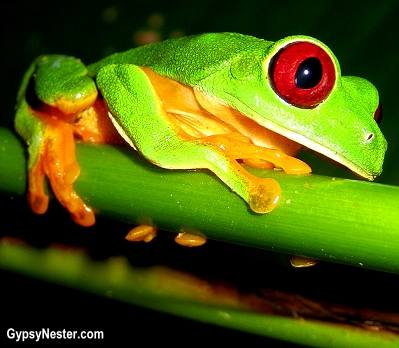 Costa Rica is widely recognized as a top destination for eco-tourism.
Costa Rica is widely recognized as a top destination for eco-tourism.
If that conjures up visions of carrying a backpack through the jungle, sleeping in tents, and living off of nuts and wild papayas, we can relate.
See more about these red-eyed noctunal fellas!
But that was before The Parador Resort & Spa brought us to Central America to show us the greener side of luxury.
Arriving on a late flight into San Jose, we were picked up at the airport and whisked off on a dark, two-hour journey deep into the jungle.
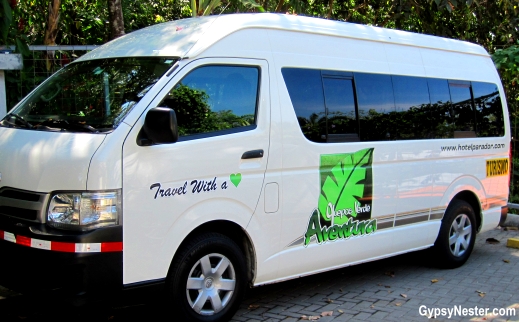
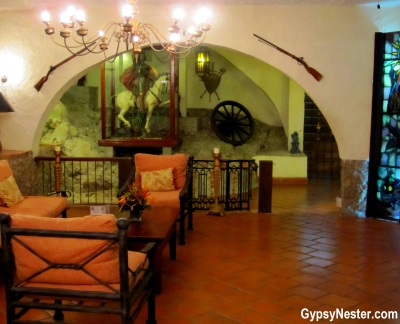
Heartily greeted in Parador’s antiques-filled, open-air lobby with a cool towel and a refreshing beverage, we soon found ourselves sitting on our suite’s balcony.
Staring into the darkness, listening to the ocean and (at the time unknown) animal sounds, the setting gave us a “me Tarzan, you Jane” feeling.
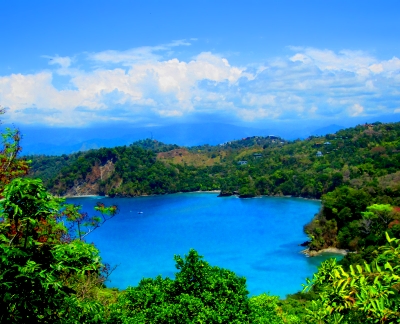
But, upon waking the next morning, we discovered the accommodations were much more than any apeman and his mate ever could have imagined.
You could have knocked us over with a toucan feather when we saw what we couldn’t see in the dark.
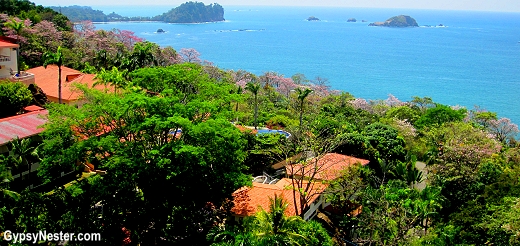
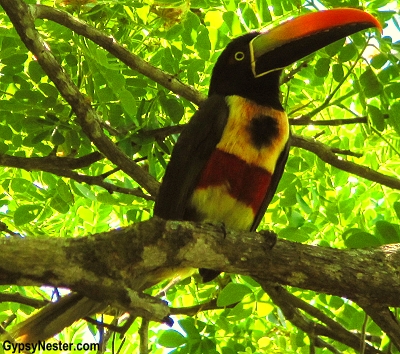
Going well beyond the recycling of a few cans and using energy efficient bulbs, Parador has adopted policies and initiated programs to minimize their environmental impact and coexist with surrounding jungle.
All while providing service and amenities we’d more likely expect in the concrete jungle of a downtown city hotel.
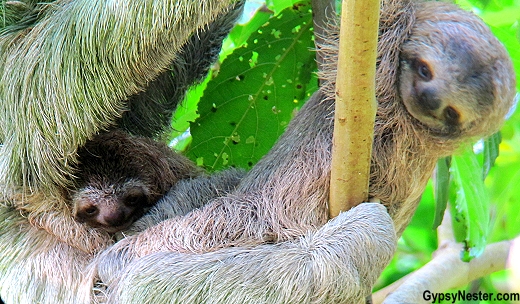
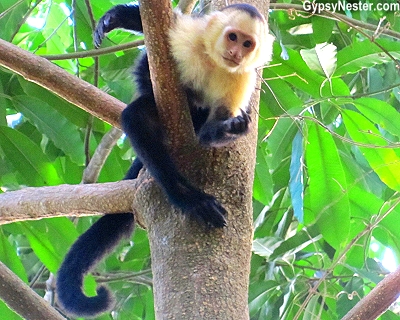
Parador does more than just coexist with its surroundings, the biodiversity of the forest on the grounds has not only been sustained, it has actually increased since the hotel was built in 1993.
By the end of our first day, we had seen a cane toad, four types of frogs, two sloths, countless birds, three species of bats, and a troop of white-faced Capuchin monkeys.
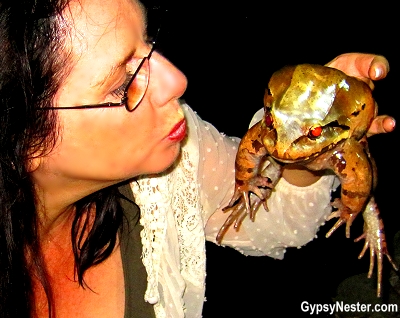
See more about our Costa Rican night tour!
Onsite expert guides were on hand to show us the ropes of spotting the wildlife our ridiculously untrained eyes easily missed.
We learned quickly after our first unsuccessful, unaccompanied hike along the Monkey Trail that having an enthusiastic animal spotter along with us made all the difference in the world.
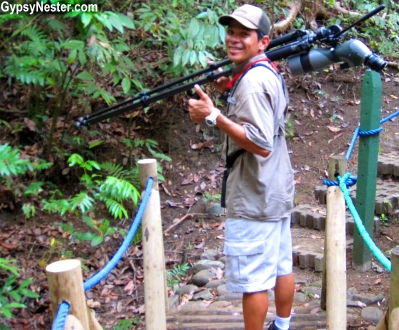
Our favorite guide, Danny, brought the jungle to life for us.
Carrying a pair of binoculuars, a tripoded telescope, and a crazy-keen ear for animal sounds, Danny giddily pointed out the abundace of wonders we walked by just hours earier.
The view from our balcony – with howler monkeys serenading us!
Click the pic to hear them!
By the end of our stay, we had been within a few feet of three monkey species native to Costa Rica.
Mornings and evenings we often saw mantled howler monkeys in the trees below our balcony.
When we didn’t see them, we certainly heard them – they are the loudest land animal on the planet and their banterings never ceased to amaze us.
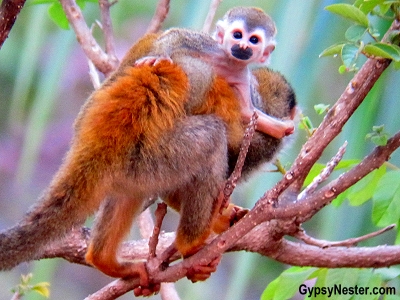
One morning while walking to breakfast, we encountered a large troop of rare Central American squirrel monkeys (with babies riding on their backs!) chowing down on dates right outside the spa.
We stood in wonder as the little guys stripped the ripe fruit off the tree, stopped for a bit of grooming, and melted our hearts with their simian antics before moving on to their next jungle destination.
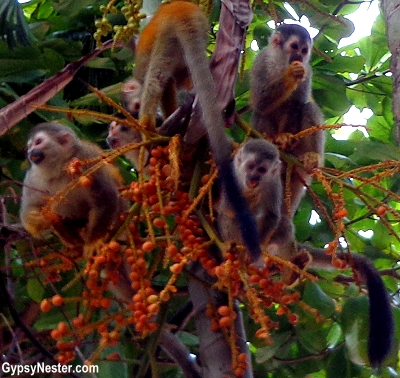
It was fitting that we would get this uncommon viewing, since the hotel is involved in the preservation efforts for these little endangered primates, known in this area as Mono Titi, through the Titi Conservation Alliance.
Our hostess, Marja, proudly told us that through several initiatives, including the planting and mantaining of the proper indigenous trees, the Mono Titi population is much larger in the area than it was when she and her parents began building Parador two decades ago.
Eco-friendly does not have to mean “roughing it”
In order to help these and all of the flora and fauna thrive, Parador has become a leader in sustainable tourism. They are recognized as such by the Costa Rican Tourism Board, achieving the top honor of a 5-Leaf Sustainability Award.
Even more impressive, they were chosen from worldwide entries by National Geographic Traveler as the HSMAI 55th annual Adrian Awards winner for The Leader in Sustainable Tourism.
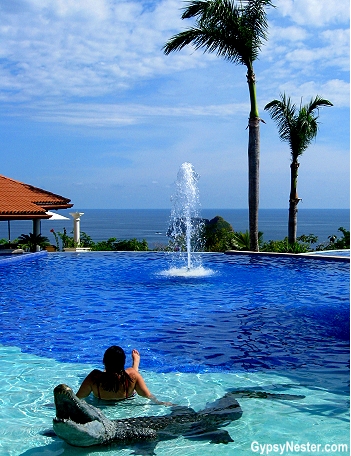
When we spoke to the general manager, Jorge, he explained several of the unique systems involved with creating one of the world’s most environmentally friendly destinations.
Of course paper, bottles, and cans are all recycled, but also every drop of waste water is reused within the grounds for landscaping. This means that all of the soaps, shampoos, and detergents must be biodegradable.
Staff education also plays a major role, each new team member is instructed so that they can become an integral part of the process.
Guests are invited to learn more too, although we — and all the visitors — participated without even noticing.
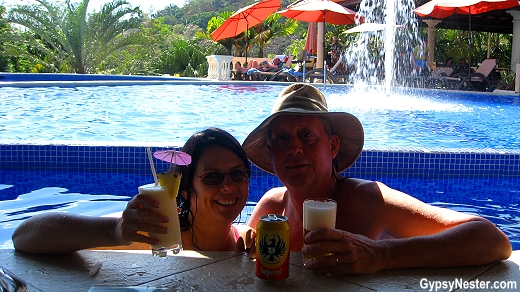
Even as we sat down to enjoy a fine meal we were passively participating. Parador doesn’t waste anything.
As we said, we were not scavenging the jungle for fruits and berries, we left those for the myriads of monkeys that we shared the property with.
But unlike our primate neighbors are prone to do, no fruit or vegetable peels are thrown away. Steps are taken to recycle and reuse almost all of the kitchen waste.
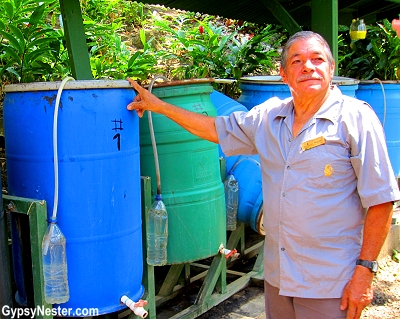
Anything that can compost is sorted out and sent through an elaborate process that supplies all of the fertilizer, mulch and potting soil for the entire resort.
This we had to see, and Jorge was more than happy to take us to meet Manuel, who is in charge of the program and is visited from far and wide as an expert in his field.
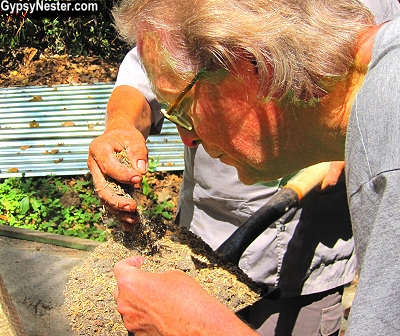
Don Manuel explained how each day’s refuse is added to a barrel for one week, then the container is sealed and nature takes its course. By adding natural bacteria, Manuel manages the decomposition so that the entire process is clean, controlled, and even smells okay.
During the procedure liquid is drained off and used as fertilizer. Each week a new barrel is started, continuing for ten weeks.
At that point the first barrel’s ready to start all over again. Its contents are emptied and allowed to dry so it can become mulch, then some is fed to worms to break it down, while the rest is sifted into an incredibly rich potting soil.
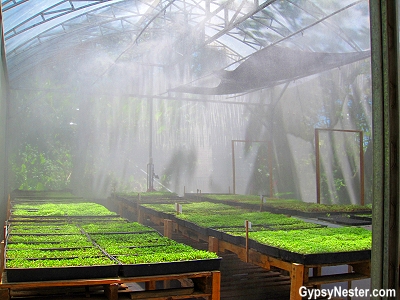
Much of that is then used in the greenhouse to grow some of the tastiest micro greens we’ve ever grazed on.
Like any greenhouse, this is all about climate control, but here the plants are cooled by mist machines and entertained with music.
We were skeptical until we tried them. Trust us, happy greens make luscious, tasty greens. And after the greens are picked and end up on our plates, even the roots are recycled back into the mulch.
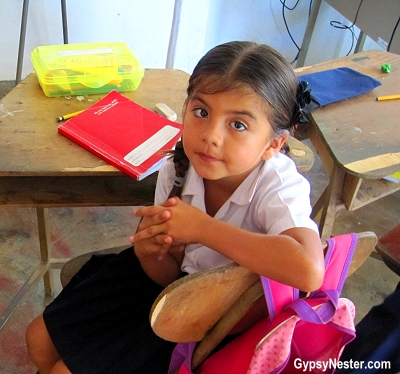
We visited one of the schools Parador supports!
In addition to helping preserve the monkeys, the resort participates in Pack With a Purpose, helping to gather needed supplies for schools, and was instrumental in building a community theater in the nearby village of Quepos.
Young people now have a place to perform, as well as learn music and theater, and everyone gets a chance to enjoy shows by international artists, as we did with a group of world-class classical guitarists from the USA.
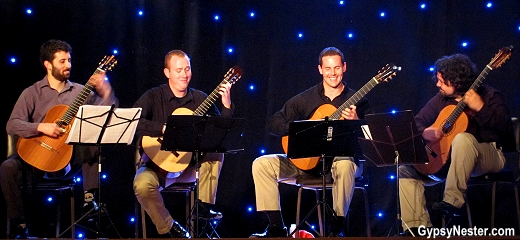
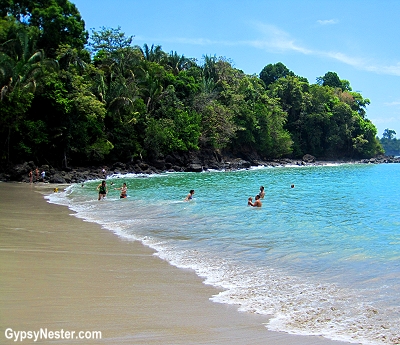
The word parador means a stopping place for travelers, centuries ago in Spain they were the predecessors of today’s hotel.
In modern day Costa Rica, the name Parador has come to mean much more than just a stopover for people passing through.
It is a place to become one with your surroundings.
David & Veronica, GypsyNester.com
Visit the Parador Resort and Spa website
A HUGE gracias to Parador Resort and Spa for providing this adventure! As always, all opinions are our own.



I really like your writing style, superb information, thankyou for posting : D.
I stayed at El Parador years ago. One of the things I remember the most were the bus with their wings spread in the morning and the monkeys coming to play at lunch. Looks like you had a beautiful experience! Pura Vida!
Some great pictures! Costa Rica is so green! It’s good to see the local people embracing some sustainable practices.
Thanks Troy! We had a great time.
Love all the photos! This brings back memories. I did a study abroad program in Costa Rica for a semester when I was in high school. That was nearly 20 years ago, so I’m sure much has changed in Costa Rica since.
Thanks Jennifer! No doubt a lot has changed, but I’ll bet a lot has stayed the same too.
How many ways are there to say “fabulous”?
In Costa Rica the best way is “pura vida.”
I love it when a country recognizes the need for environmentally responsible tourism. I just returned from Bhutan and they too seem to be getting it right. Hopefully it is a trend!
Costa Rica really embraces it, and happily, it does seem to be a trend.
Thank you David and Veronica. What a wonderful story to share, I love the way you wrote it. Not a boring moment and all true facts!
Thanks again for visiting us and good luck on your next ventures.
Costa Rica really does seem to be leading the world – or at least Central America – in eco-tourism, which is pretty damn awesome.
They are very committed to it, and yes it is awesome!
Que lindo. Where is the resort? I looked at their website, but couldn’t tell. If it’s 2 hours from San Jose, would I be correct in assuming it’s on the Atlantic Coast?
It is on the Pacific, south west of San Jose. Near the town of Quepos and right by Manuel Antonio National Park.
I love this post in its entirety! I love to see other promoting eco-tourism. 🙂 The photos are great! Thanks for sharing!
Thanks Mary, Parador is really a fantastic place!
Thank you so much for sharing your experiences and photographs–gives me the opportunity for a vicarious visit to that amazing paradise!
Always our pleasure to share our adventures, Kern. 🙂